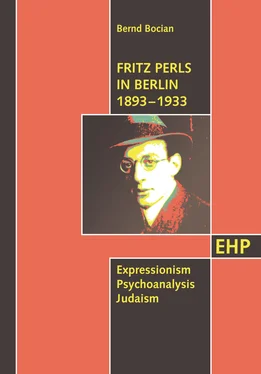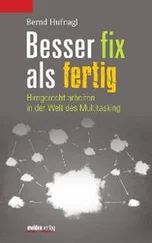Bernd Bocian - Fritz Perls in Berlin 1893 - 1933
Здесь есть возможность читать онлайн «Bernd Bocian - Fritz Perls in Berlin 1893 - 1933» — ознакомительный отрывок электронной книги совершенно бесплатно, а после прочтения отрывка купить полную версию. В некоторых случаях можно слушать аудио, скачать через торрент в формате fb2 и присутствует краткое содержание. Жанр: unrecognised, на английском языке. Описание произведения, (предисловие) а так же отзывы посетителей доступны на портале библиотеки ЛибКат.
- Название:Fritz Perls in Berlin 1893 - 1933
- Автор:
- Жанр:
- Год:неизвестен
- ISBN:нет данных
- Рейтинг книги:3 / 5. Голосов: 1
-
Избранное:Добавить в избранное
- Отзывы:
-
Ваша оценка:
- 60
- 1
- 2
- 3
- 4
- 5
Fritz Perls in Berlin 1893 - 1933: краткое содержание, описание и аннотация
Предлагаем к чтению аннотацию, описание, краткое содержание или предисловие (зависит от того, что написал сам автор книги «Fritz Perls in Berlin 1893 - 1933»). Если вы не нашли необходимую информацию о книге — напишите в комментариях, мы постараемся отыскать её.
Fritz Perls in Berlin 1893 - 1933 — читать онлайн ознакомительный отрывок
Ниже представлен текст книги, разбитый по страницам. Система сохранения места последней прочитанной страницы, позволяет с удобством читать онлайн бесплатно книгу «Fritz Perls in Berlin 1893 - 1933», без необходимости каждый раз заново искать на чём Вы остановились. Поставьте закладку, и сможете в любой момент перейти на страницу, на которой закончили чтение.
Интервал:
Закладка:
In order to grasp the social context here as well, we must not forget that higher education ultimately bore status or class character. »In Prussia, prior to the First World War only five percent of all pupils progressed beyond a basic elementary education« (Günther et al. 1973, 416). In the higher secondary institutions, one encountered virtually no children from blue-collar families. Conditions within the home would not allow it, and as a rule the money for children to attend primary school was not available either. The wages of working women were even lower than those of the men; children of compulsory school age often had to work and contribute their earnings as well.
In contrast to the children above, the offspring of German-Jewish families generally had the opportunity to acquire the cultural capital of education. Investing their learning energy in universally valid fields of knowledge (medicine, technology, etc.) was attractive, because these were viewed as »transferable.« This must be viewed against the background that in many families from Eastern Europe memories of expulsion or of fleeing from pogroms to other countries remained vivid. Naturally, the educational ideal of bourgeois-humanism also played a role:
Having a son in an intellectual, widely recognized profession that was morally unassailable because it was dedicated to human health, the law, or the advancement of knowledge – this was the ideal that German-Jewish middle-class parents, the fathers above all, envisaged for their male offspring. (Riecker in Heer 1997, 25)
The well-educated young men (increasingly young women as well) from Jewish families »now shot into, or, better said, shot upward within society« (Amery in Engelmann 1998, 348). Many a German student of the Mosaic faith who diligently applied himself to his studies forged a career, overtaking his Christian fellow students, who were bellowing drinking songs and dueling in their fraternities. This also numbered among the reasons for the »stalwart anti-Semitism« (ibid.), particularly in German student fraternities, which later energetically supported the nationalist revolution in 1933, thereby additionally liberating them from the »torturous pressure of Jewish talent« (ibid., 349). In referring to »Aryan anti-Semitism,« Amery mentions a factor that is certainly important: he proposes that Hitler’s national socialistic racism was not only socialism for those who were stupid, but appealed as well to the self-esteem of many young, middle-class men who were the »losers of modernization« (ibid., 350).
3.4.2 Cruel Teachers and an Absent Father
After finishing elementary school, Fritz Perls entered the »classically oriented« Mommsen Gymnasium in the Charlottenburg section of Berlin, as befitted his social status. Several years later, Herbert Marcuse would also attend this institution. The curriculum focused on ancient languages, studying the authors of classical antiquity, and the history of ancient Greece and Rome. Latin and Greek were the dominant languages, and ancient literature was read in the original. Perls himself remembered reading texts by Sophocles and Plato in the original Greek (see Perls 1977, 75). Additional subjects included French and naturally German, religion, mathematics, the natural sciences, history, writing, drawing, geography, gymnastics, and singing.
Due to its location in one of Berlin’s more affluent middle-class neighborhoods, the percentage of pupils of the Mosaic faith at Mommsen Gymnasium was quite high, so that it was later closed by the Nazis. 27Nevertheless, this changed nothing about the fact that the originally humanistic educational concept underlying this type of school had long since been replaced by the insemination of German-nationalist values. The authors of German classical literature (Goethe, Schiller, Kleist, Hölderlin, etc.) had to a large extent been stripped of their cosmopolitanism and humanism. They were subjected to national-chauvinistic interpretation and were accordingly introduced foremost as great Germans.
Although in a less crude manner than in elementary schools, secondary schools such as this prepared youths for veneration of the Emperor, obedience, subordination, and confluence with the state, while at the same time instilling arrogance toward other nations and peoples. Referring to the Wilhelminian school system, Albert Einstein remarked that the most horrible thing was »when a school works with the methods of intimidation, violence, and artificial authority as a matter of principle. Treating pupils with such methods destroys their healthy emotions, forthrightness, and self-confidence, thereby producing subservient subjects« (in Friedrich 1973, 202).
This is the mentality that Heinrich Mann described in his novel »Man of Straw.« It identifies with the authority of state, grovels under what’s above, and treads on what’s below. That style of dealing with other people, together with cruel teachers who used physical blows, classroom seating changes, and detention as punishments, encouraged not only servility and a willingness to conform, but also the potential rebels, as many autobiographies from those times attest. In ninth grade, George Grosz returned the blows and was expelled from school, John Heartfield participated in a pupils’ revolt and landed in a correctional school, and Bertolt Brecht’s rebellious insolence caused a school scandal. Looking back, Kurt Tucholsky later wrote of »the murder and the theft of souls« (in Hepp 1999, 47 f.) and of the character strength required to say a clear, loud »No« in that kind of atmosphere. Here, we would like to underscore the importance Perls later assigned in Gestalt therapy to a clear »No« as a means of creating stability and ego boundaries.
Hermann Hesse described this other kind of strength of character in 1919 in his brief essay on the virtue of self-will (Eigensinn) (see Hesse 1988). In no other country were as many novels written about school and education as in Germany. »Often they involved tragedies of despair and student suicide, but they always included incriminations of a school system that praised disobedience in the heroes and warriors of history, but generally punished young school rebels without mercy« (Hepp 1999, 47).
Apparently, Perls had been lucky with his teachers in elementary school, but in an atmosphere like this it was almost certain that the performance of the former top student in his class would decline. School turned into a »nightmare« (Perls 1977, 178), the above conflicts and battles at home broke out in parallel, and he was threatened with being put into a correctional school. The headmaster of Mommsen Gymnasium was a Dr. Alfred Przygode, 28and Perls recalled that »the director had a Polish name, and possibly to prove his Aryan blood he was very, very nationalistic. The school was new and he gathered a staff that can best be described by paraphrasing Churchill: Seldom have so few teachers tortured so many children for such a long time« (ibid., 251).
A further and without doubt profound experience from his school years is mentioned in one sentence only: »The basic attitude was discipline and anti-Semitism« 29(ibid.) Nationalistic values themselves defined the Jewish minority as not belonging, which implied foreignness and inferiority. For young minds who came from assimilated liberal homes and took their German identity for granted, this must have been confusing and unsettling. With respect to her brother’s experience with manifest and latent anti-Semitism at the Mommsen Gymnasium, Perls’s sister, Grete, remarked, »And, being a sensitive boy, he felt it and he was infuriated by it« (in Gaines 1979, 3).
Even at an advanced age, Perls remembered exactly which of his classmates were Jewish in origin. »We were four Jews in our class. Krafft became a psychoanalyst. Schildkraut made a name for himself in the movies, and Hollaender composed many lovely songs for Marlene Dietrich« (Perls 1977, 252). 30In my opinion, what Perls experienced here contributed to his lifelong sense of not belonging anywhere. Moritz Goldstein, a native of Berlin, recalled the Christian classmates who were his friends at school. »I hoped that a relationship that included mutual visiting would develop with these new classmates, whom I admired, but nothing came of it. (…) They simply didn’t want it, or their parents had given strict orders not to bring the Jew home with them. In our day-to-day contacts, I never felt any anti-Semitic sentiments« (in Rürup 1995, 159). In principle, every Jewish child had this experience during its school years. Something similar applied on the family level. In the business world, for example, dealings between Germans of the Christian and the Mosaic faiths were thoroughly cordial, but in their private lives German-Jewish families mingled almost exclusively with other families of Jewish origin. In her memoirs, Lore Perls explicitly confirms this and points out that social contacts within the Posner home were restricted to »upper-class Jews« (see L. Perls 1997, 28). As a result, there was yet another sensory experience that could mean stimulation of a tendency toward obsequiousness and confluence or, as in Perls’s case, toward rebellion and egocentricity. Walter Rathenau, the successful industrialist who became foreign minister of the Weimar Republic and was assassinated by a German nationalist university student, summed up this collective wound with the words: »During the younger years of every German Jew there is a painful moment that he remembers for his entire life: the first time he becomes fully aware that he has entered the world as a secondclass citizen and that no amount of diligence or merit can free him from that situation« (in Rürup 1995, 133).
Читать дальшеИнтервал:
Закладка:
Похожие книги на «Fritz Perls in Berlin 1893 - 1933»
Представляем Вашему вниманию похожие книги на «Fritz Perls in Berlin 1893 - 1933» списком для выбора. Мы отобрали схожую по названию и смыслу литературу в надежде предоставить читателям больше вариантов отыскать новые, интересные, ещё непрочитанные произведения.
Обсуждение, отзывы о книге «Fritz Perls in Berlin 1893 - 1933» и просто собственные мнения читателей. Оставьте ваши комментарии, напишите, что Вы думаете о произведении, его смысле или главных героях. Укажите что конкретно понравилось, а что нет, и почему Вы так считаете.











